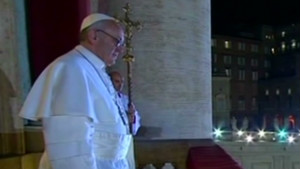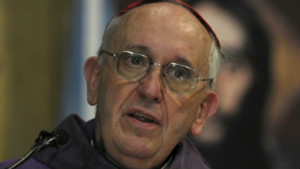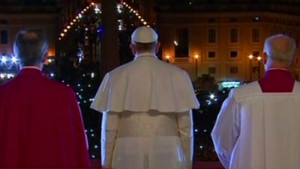He is known also as a
patron saint of Italy, the founder of the Franciscan order of the Friars
Minor, an admirer of nature and a servant to poor and destitute. The
brown robe of the Franciscans is iconic.
"Who doesn't know Francis
of Assisi, who abandoned everything from wealth and prestige and who
became poor himself," Vatican deputy spokesman the Rev. Thomas Rosica
said Wednesday, explaining how the saint inspired Pope Francis' name.
"Francis of Assisi is a
great, great figure in the church but known especially for connecting
with fellow Christians and many people outside the Christian family,"
Rosica said.



 A smoky day for pope coverage
A smoky day for pope coverage
Many popes have written and spoken of St. Francis of Assisi, according to the Vatican's website.
In an encyclical, Pope
Pius XI stated that "there has never been anyone in whom the image of
Jesus Christ and the evangelical manner of life shone forth more
lifelike and strikingly than in St. Francis."
St. Francis "was also rightly spoken of as 'another Jesus Christ,'" Pius XI said.
He was born in Assisi in
1181 or 1182, the son of a rich cloth merchant, and he enjoyed a
carefree adolescence and youth, particularly with troubadours.
He went to war at age 20
and was taken prison for almost a year. He was released and became
seriously ill, which began a major turn in his life.
When he returned to Assisi, a spiritual change commenced, and Francis abandoned his worldliness.
He met with lepers and extended a kiss to one.
In rags, he lived among beggars at St. Peter's Basilica in Rome.
And in one renowned
episode, he went to the tattered small church of St. Damian, where
Christ on the cross came to life and told him: "Go, Francis, and repair
my Church in ruins," recounted Pope Benedict XVI in a 2010 address,
according to the Vatican website.
"The ruinous state of
the building was a symbol of the dramatic and disquieting situation of
the church herself," Benedict said. "At that time the church had a
superficial faith which did not shape or transform life, a scarcely
zealous clergy, and a chilling of love."
Francis' father
questioned his son's generosity and servitude to the poor. While
standing before the bishop of Assisi, Francis stripped off his clothes
and renounced his paternal inheritance, Benedict said.
Francis lived as a
hermit. He went to Rome in 1209 to propose to Pope Innocent III a plan
for a new form of Christian life, Benedict said.
The Franciscan order was born.

ไม่มีความคิดเห็น:
แสดงความคิดเห็น